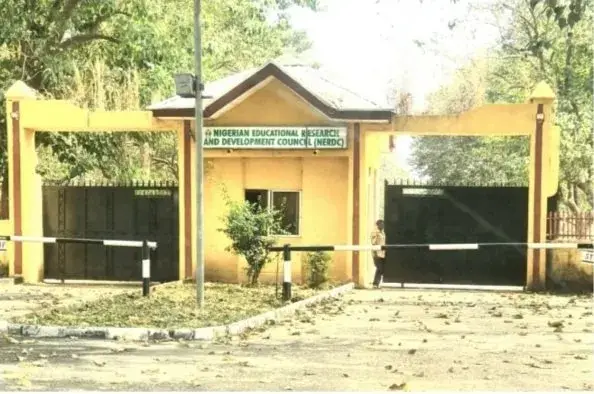News
How unapproved Textbooks Sneak Into Nigeria’s Education System — Investigation

JOSEPH Frank (not real name), who graduated from the university top of his class in Mathematics, has always wanted to be an author and has compiled 200-page materials that junior secondary school students can use as a textbook.
He, however, faces the daunting task of getting the book certified and accepted for use in the nation’s schools. To get the certification by the Nigerian Educational Research and Development Council, NERDC, he has to pay N60,000 for the certification exercise.
The Council charges N300 per page for each textbook brought for certification. An author is also to submit four copies of the textbook in a ready-to-print format.
Even after paying the amount, when the book is going to be assessed is not within his power. The Council waits until it has enough materials for it to call experts to come and assess materials on the ground. It could take months or years during which events may overtake some of the things written in the book.
After certification, the textbook is taken to the Universal Basic Education Commission, UBEC and with that, an author is only sure that the textbook stands the chance of being recommended for use in Federal Government-owned schools,
For an author who wants his book approved for use at state level, he has to go to the Curriculum Service Department in the Ministry of Education in the state. There are 36 states in Nigeria, excluding the Federal Capital Territory, Abuja.
Feeling frustrated by the cost involved and the attendant bureaucracy in getting a textbook accepted for recommendation, the likes of Frank resort to self-publishing and taking unapproved routes to get their textbooks used in schools.
What we do and the challenges – NERDC
The NERDC was set up in 1988 and is empowered to develop, review and enrich curriculum at all levels. “We also undertake and promote book development, and local authorship for quality assurance; conduct educational research for public policies formulation and implementation,” the spokesman, A.N Tochukwu, said.
On the cost of certification and the process, Tochukwu stated: “Yes, it is N300 per page and four copies of the book are submitted for assessment. After the certification is done, the approved book is taken to UBEC and State Universal Basic Education Boards for approval too.
The approval at state level is because each state is given some leeway to add something peculiar to it to the curriculum a textbook is to follow. But generally, a textbook to be used for a particular subject should contain materials that will be generally acceptable nationwide.
“Somebody will not just drop a textbook now and think because of that single item, the Council will bring experts from across the country to assess it. Because of the cost factor, the assessment is done periodically, when there are enough materials for the experts to work on,” he explained.
Some new and young authors are also raising the allegation of partiality in the approval of textbooks, saying established authors and big publishers are favoured over others. However, a staff in the Curriculum Service Department, Lagos State Ministry of Education, who craved anonymity, debunked that.
In a chat with Vanguard, he said: “The truth is that there is a penchant for Nigerians to believe allegations without proof.
We look at several criteria in reviewing the books and these books are reviewed by independent reviewers who are teachers, and who do not know others in the group. So, tell me how can all the reviewers be accused of being partial? “Do you know that there are some books which have been approved, and the books are being used already, yet the authors do not know that their works have been approved and in use? Why? This is because there is already a misconception of the process used by the department to approve or disapprove a book.
“Again, when some books get delisted for not meeting the set criteria, the authors would raise the allegations of asking to lobby for approval. For a book to be approved, there are several criteria to meet. And if the book meets the criteria, it is then sent for review. This passes through about three independent reviewers who do not know one another. After this process, the department assembles the feedback and a final decision is taken.
You see, it is a great task.” On the issue of some people trying to cut corners, the source noted that with the current administration, the department has few or no bad eggs. He, however, explained that one could not rule out the possibility of having such persons in an organisation.
How unapproved books get into schools
Mr. Dare Oluwatuyi, the President, Booksellers Association of Nigeria and who is also the Chairman, Nigerian Book Fair Trust, said corruption makes such books to find their way into classrooms. “When a book does not go through certification, it shouldn’t be in schools, but corruption has made some books to be adopted against all rules and that is illegal.
Some books don’t even have ISBN number. They didn’t go through proper procedures. They are mostly self-publishing; everything done by the authors. At CSS Bookshop, we don’t accept such books – binding and printing must be standard,” he noted.
According to him, some people would just assemble certified books by different authors and take different chapters from each book without consideration for the curriculum needs of the students and publish such illegally.
Oluwatuyi explained that the danger in such a situation is that students would end up studying wrong things which would lead to failure and their future jeopardized. It was gathered that Nigeria loses over N30 billion annually to book piracy.
He suggested that the Nigerian Copyright Commission, NCC, should be strengthened to work with other stakeholders in the industry to curtail the menace of piracy. Our source at the Ministry of Education in Lagos, while reacting to how unapproved books get to be used in schools, blamed the situation on some private school owners.
He added that authors and publishers involved in such act target private schools that are more in number than public schools.
“When we release a list of approved books, there is an obligation for such books to be used by schools. You, however, find out that some schools, most especially private ones, do not follow such a list because they want to make profit from the sale of books in their schools. But for public schools, the case is not so.
One, some textbooks are given free of charge to the children and if anyone or school is found to be collecting money for the sale of books, such person or school gets the appropriate sanction.
“For instance, a book we reviewed had some of its contents changed. What do we do? One of us visited his child’s school for a book reading event. While one of the books was being read, it was discovered that it was different from what we had reviewed. We had to call the attention of the author. This is a pathetic issue, and stakeholders must rise up to the occasion. Some authors and publishers are using some mechanism to frustrate the war on piracy.”
Private school owners’ reaction: The President, National Association of Proprietors of Private Schools, NAPPS, Chief Yomi Otubela, said members of his association are not involved in circulating or using unapproved textbooks to teach pupils and students.
“We are not involved in that. Our schools are registered with the government and relevant agencies of government in the quality control and assurance department visit our schools and do the needful regarding how the schools are run in accordance with stipulated guidelines and rules.
“Moreover, the Ministry of Education gives us the list of approved textbooks for each subject. They may recommend three or more textbooks for a particular subject. Be rest assured that such textbooks have met the required standard regarding curriculum. A particular school may choose book A for a subject and another school may choose book B.
Any school involved in such an act is not run by our members. We want our products to do well and we know the importance of using textbooks that meet the curriculum needs of our students. Those involved in such act should he dealt with accordingly,” he said.
What fuels cutting of corners: Oluwatuyi noted that ordinarily, it is the duty of a publisher to guide the author to ensure the author writes according to the demand of the curriculum of a particular subject.
“Now, the cost of going for review and certification is high. N300 per page at NERDC. That means if you have a 300-page textbook, you will pay N90,000. That only ensures recommendations at federal schools. States charge different rates. And normally, a publisher would want his books accepted across the country, so, you can guess what that would cost.
“If a book fails the review exercise, the reviewers will put their remarks as to why it failed and the need to upgrade it. We have also complained about the cost of review. In some instances, our appeals have led to some state governments reducing the review cost. But the high cost is not only felt by small publishers but big ones too. Some big publishers may only take say three books per subject for review. They may not be able to take as many as they want because of the cost.”
Oluwatuyi added that if a book fails the review exercise, the debt is borne by the author and the publisher who have to wait for another review exercise. Also, approved books are ranked according to what they scored during review, giving room for desperation for books to be ranked well and the attendant human factors.
Why books are no longer transferable: Unlike in the days of yore when a textbook used by a sibling some years earlier could still be used by his younger ones, the situation nowadays has changed.
Knowledge keeps expanding and what a textbook contains this year may become obsolete the following year, especially in the area of science and technology.
Just like Tochukwu of the NERDC noted, Oluwatuyi also confirmed that a review of books is done periodically – in some states every two, three or four years.
“Some subjects do not change while some need to be reviewed to meet dynamic changes as the case may be. Normally, textbooks are reviewed every three years in Lagos State.
This may be to improve on some content, to remove obsolete content, or sometimes, to remove sexual or vulgar content. So, when the above happens, there may be a need for the children to get the current edition.
Again, approving only some authors over time may kill the creative industry. That is why the window to submit books for approval is open to all provided the criteria are met. This brings me again to the issue of lobbying. If there has to be lobbying, how many books can be lobbied when we have about 97 subjects to review, and approve?” said our source in Lagos Education Ministry.
What the government can do: “If there are no books, what will the teachers and students use? You may say authors, publishers and even printers are in business, but our industry is not the food industry. We should be encouraged.
-

 News5 days ago
News5 days agoInsecurity: Kogi Schools Resume On Monday
-

 Opinion4 days ago
Opinion4 days agoDon’t Pull the Plug: Why Nigerians Are Pleading for the U.S. to Extend Its Police Training Program — and Why It Must Synergize With New Military Arrivals
-

 Crime4 days ago
Crime4 days agoVigilante Reportedly Shoots Colleague Dead In Plateau
-

 Crime4 days ago
Crime4 days agoMan Shot Dead In Ambush Along Jol-Sho Road In Plateau

